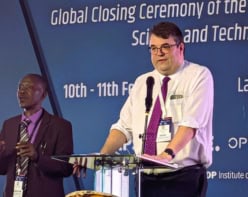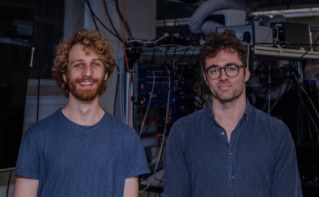Matin Durrani explains how you can join in the celebrations for the third World Quantum Day, which takes place on Sunday 14 April 2024
Sunday 14 April 2024 will be the third World Quantum Day. An annual celebration “promoting public awareness and understanding of quantum science and technology around the world”, it’s a bottom-up initiative from scientists in more than 65 nations from Algeria to Zambia. The day of 14 April has been chosen because “4.14” are the first three digits of Planck’s constant when rounded up: 4.14 × 10–15 eVs.
The pedant in me is irked a bit by the date. Unless you live in the US, 14 April is surely 14.4 not 4.14. Plus, I’ve always known Planck’s constant as 6.63 × 10–34 Js not 4.14 × 10–15 eVs. Putting that aside, World Quantum Day is a brilliant initiative. These are great times for quantum physics, with burgeoning applications of “quantum 2.0” technology such as quantum computing, sensing and cryptography.
Can you solve this quantum cryptic word search?
As James McKenzie describes in his recent feature article, overall private investment in quantum tech stood at $1.2bn in 2023 according to the State of Quantum 2024 report. Sure, that figure has dropped sharply since 2022, but up to $50bn in public cash has already been ploughed into quantum science. In fact, 33 countries around the world have government initiatives in quantum technology, including 20 with full-scale national strategies.
One person with an overview of the quantum-technology landscape is Mauro Paternostro from Queens’ University Belfast, editor-in-chief of the IOP Publishing journal Quantum Science and Technology. In a wide-ranging interview to be published next week, he argues that the most advanced quantum technology is actually quantum sensing.
In fact, as Steve Brierley – chief executive of Riverlane – points out in his recent opinion article, quantum computers will only ever be properly useful once we can properly deal with error correction.
But quantum tech holds great promise, including in Africa, where “steady progress” is being made, according to Farai Mazhandu and Mhlambululi Mafu. Output from African researchers in quantum-related fields is relatively small, but with a young, digitally native population and a burgeoning quantum workforce, they believe the continent is “poised to take advantage of the coming ‘second quantum revolution’”.
If all this talk of technology is too much, check out the feature by Philip Ball, who looks at the work of “quantum plumbers”. Meanwhile, Robert P Crease, Jennifer Carter and Gino Elia examine “Wigner’s friend” – a quantum thought experiment that has stumped physicists and philosophers for more than 60 years. And why not try our quantum-physics cryptic word search and see if you can reveal the hidden message.
Finally, do check out the Physics World quantum channel as well as a special collection of quantum-themed research articles, focus issues and ebooks from IOP Publishing, which publishes Physics World.
And don’t forget to sign up for the first Physics World Live event – an online panel debate in partnership with Reports on Progress in Physics where you can hear from leading researchers, including Nicole Metje from the University of Birmingham in the UK, discuss the latest on quantum sensors.




